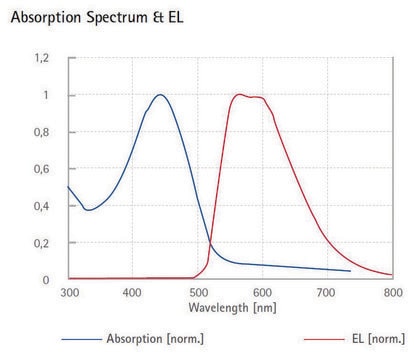923222
Poly(9,9-dioctylfluorenyl-2,7-diyl) end capped with dimethylphenyl
Mw 50,000-150,000 by GPC
Synonym(s):
PFO-DMP
About This Item
Recommended Products
description
PL: 421 nm in THF
Quality Level
mol wt
Mw 50,000-150,000 by GPC
greener alternative product characteristics
Design for Energy Efficiency
Learn more about the Principles of Green Chemistry.
sustainability
Greener Alternative Product
band gap
2.5 eV
solubility
THF: soluble
chlorobenzene: soluble
chloroform: soluble
dichlorobenzene: soluble
λmax
368 nm in THF
Orbital energy
HOMO -5.3 eV
LUMO -2.8 eV
greener alternative category
General description
Application
related product
Storage Class Code
11 - Combustible Solids
WGK
WGK 3
Flash Point(F)
Not applicable
Flash Point(C)
Not applicable
Choose from one of the most recent versions:
Certificates of Analysis (COA)
Sorry, we don't have COAs for this product available online at this time.
If you need assistance, please contact Customer Support.
Already Own This Product?
Find documentation for the products that you have recently purchased in the Document Library.
Articles
Novel biosensing devices, like bio-FET sensors, offer label-free analysis by detecting ionic and biomolecular charges, crucial for diagnostics and biological research.
Novel biosensing devices, like bio-FET sensors, offer label-free analysis by detecting ionic and biomolecular charges, crucial for diagnostics and biological research.
Novel biosensing devices, like bio-FET sensors, offer label-free analysis by detecting ionic and biomolecular charges, crucial for diagnostics and biological research.
Novel biosensing devices, like bio-FET sensors, offer label-free analysis by detecting ionic and biomolecular charges, crucial for diagnostics and biological research.
Our team of scientists has experience in all areas of research including Life Science, Material Science, Chemical Synthesis, Chromatography, Analytical and many others.
Contact Technical Service

![Poly[9,9-bis-(2-ethylhexyl)-9H-fluorene-2,7-diyl] light-emitting λem 409 nm (in chloroform)](/deepweb/assets/sigmaaldrich/product/structures/186/919/a69a261c-1d02-44b4-82ab-119ad6c9d843/640/a69a261c-1d02-44b4-82ab-119ad6c9d843.png)

![Poly[(9,9-dioctylfluorenyl-2,7-diyl)-alt-(6,6′-{2,2′-bipyridine})] Mw ≥10,000 Da by GPC](/deepweb/assets/sigmaaldrich/product/structures/229/416/b7bc5f74-105e-4593-b0f8-f605aee79aec/640/b7bc5f74-105e-4593-b0f8-f605aee79aec.png)
![Poly[(9,9-dioctyl-2,7-divinylenefluorenylene)-alt-{2-methoxy-5-(2-ethylhexyloxy)-1,4-phenylene}]](/deepweb/assets/sigmaaldrich/product/structures/303/311/48d96c0b-9463-4dd8-9ccf-3a67b7c781c5/640/48d96c0b-9463-4dd8-9ccf-3a67b7c781c5.png)



![Poly[2-methoxy-5-(2-ethylhexyloxy)-1,4-phenylenevinylene] average Mn 40,000-70,000](/deepweb/assets/sigmaaldrich/product/structures/344/488/b8f8179d-3970-4deb-a754-adda88cdb36f/640/b8f8179d-3970-4deb-a754-adda88cdb36f.png)